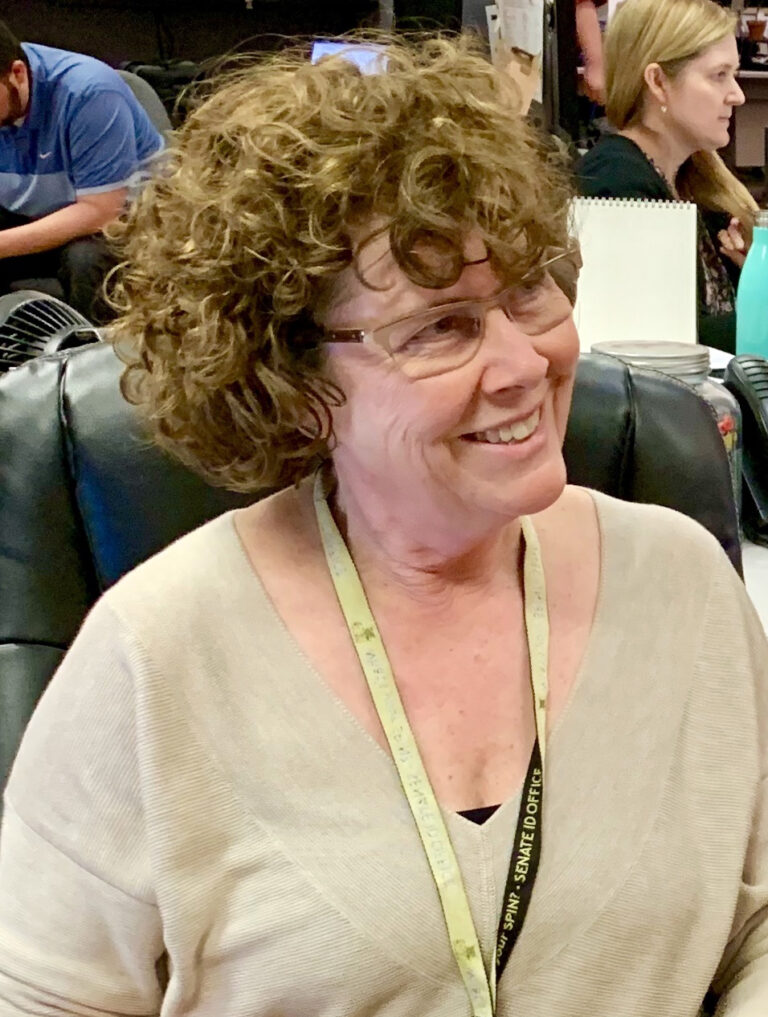Legacy Post Disclaimer
This is a #Legacy post imported from The Apalachicola Time’s previous platform. If you’re experiencing issues with this article, please email us at news@nevespublishing.com.
An uncommon clergyman
From the beginning, Eric Zile was an unusual fit to pastor Trinity Episcopal Church, a contrast made sharper when on the very first time he preached to the Apalachicola congregation, he took more than a leap of faith to accentuate his point.
“My first Sunday I got so excited I jumped over the altar rail,” said Zile.
At the reception, he enjoyed the food so much he commented that they were “the best f***ing deviled eggs I ate
“That did not go over well,” he said. “We lost a lot of parishioners after my first week and we have not regained them.
“I cuss, I tell dirty jokes, I laugh. I love Jesus but I cuss a little,” Zile said.
All that happened since that day back in August 2019, when the longtime Baltimore, Maryland priest was first hired, led to a reception two weeks ago, when a large slice of the congregation honored Zile for his dedication to their needs. He has opted to retire on disability, affected by post traumatic stress disorder.
“He’s been like a breath of fresh air,” said Cliff Butler, an active member of the congregation.
Others stood to praise the pastor for his zealousness in tending to the sick, for reaching out to all facets of the community, for his passionate preaching of the Gospel.
It’s a compassion and dedication that stems from Zile’s own trials and tribulations, both within his family, in which he’s felt the loss of two wives and two children, and in his own body, which was ravaged by his early years working in a quarry, and in his own experiences, tending to the tragedies that beset an inner-city community.
“We see these shootings, Baltimore was such a violent place,” he said. “Faces blown off, brains splattered everywhere. It was my job to comfort the families and administer the sacraments, to do my job and not allow my emotions to come out.”
Zile’s life has not been an easy one, but with his carefree spirit and his unflagging enthusiasm, you would hardly know it.
“Ever since I was 12 I always wanted to be a priest. That’s what I always wanted to do,” he said. “When there were new kids in school I was always the first one to say ‘Come on over to my house.’ I was always able to hang out with the jocks and drug addicts and the criminals. I’ve been able to walk that line almost anywhere.”
Zile admits he “ran with the wrong crowd” early on, until an adult mentor in the church made it clear to him that “if you don’t change I’m going to put my foot up your a**
“That’s when I changed,” he said. “I remember the last time I did anything illegal, it was 10 minutes before my 18th birthday at a Jethro Tull concert.
“I gave my mairjauna to the guy next to me, he was 17. That was the last time I did anything like that,” he said. “I had a magic marker and wrote ‘This is the last time Eric Zile got high’ on a wall.”
Zile tried the Navy, but failed the physical and a week before graduation was discharged. He worked in retail for a while and then went into mining. He was making $12 an hour in 1984, good money, on a union job, and was married at age 19.
“Both of us ran away from home and got married,” he said. “For the next 20 years I took night school classes and worked in quarries and on the waterfront in the harbor, logging sand and stone.”
Rail thin, Zile said they needed “skinny guys to slide between the conveyor belt, and to slide under the engine of a tugboat.”
His first brush with large-scale physical pain was in Feb 1984, when a conveyor belt froze up, and he started banging it with a hammer, advising his co-worker not to activate anything.
“As soon as I hit the belt with a hammer he hit the button,” said Zile. “My right arm, my entire right side of my body, wass pulled into the 48-inch wide belt, with a 100-hp motor. You’ve never heard a man scream like I did. Somebody found me hanging up in the air.”
Zile climbed out of the conveyor belt, but had suffered damage to his right shoulder and his ulnar nerve. “I have been on painkillers up until last February,” he said. “I almost died. Because it was 17 degrees and I had five layers of clothes on, is the only reason I lived.”
This physical pain was compounded by a series of emotional pains that helped propel Zile’s depth as a clergyman, beginning on Martin Luther King Jr. Day in 2000 when he was ordained in Maryland by Bishop Ihloff, even before he had completed seminary.
“It was allowed at that time,” Zile said.
He then became the vicar of Holy Trinity in Essex, Maryland for the next two decades, serving a diverse congregation which became the fastest growing Episcopal church in the state. “The average is seven, I stayed there 20 years,” Zile said.
Zile’s first daughter died from DiGeorge Syndrome after living for just two weeks after being born with holes in her heart and missing half of her aorta.
His second daughter survived leukemia, and is now alive and well with two children, a recent graduate from Johns Hopkins University with a masters of business administration.
Zile also raised a niece since age 16, who he always called his daughter, and she died from blood loss associated with her taking the drug Xarelto. His first wife died of brain cancer, and his second wife, also an Epsicopal priest, succumbed to the ravages of myasthenia gravis.
These encounters with illness and death led to his becoming chaplain at Johns Hopkins and at York Hospital, where he tended to situations in pediatric intensive care, and in the neonatal intensive care units.
“My daughter had cancer so they put me in the children’s oncology ward,” Zile said. “I think I buried 300 to 400 people at that hospital. I’ve seen babies boiled alive with cancer that riddled their bodies, and liver transplants that failed.”
Zile himself has contended with lifelong bouts of traumatic pancreatitis, dating back to a childhood injury, bouts that would keep him sidelined from service at Trinity at different points in his stay here.
With all of this leading to his disability, Zile has left this month on good terms with the congregation, as evidenced by their high praise of this Christian service.
Lector Rennie Edwards said a letter of agreement with an interim priest is being finalized with an August 1 start date. In the meantime, the church’s former pastor, Martha Harris, who can offer communion, and other lay people, who cannot, have stepped in to conduct services.




Meet the Editor
David Adlerstein, The Apalachicola Times’ digital editor, started with the news outlet in January 2002 as a reporter.
Prior to then, David Adlerstein began as a newspaperman with a small Boston weekly, after graduating magna cum laude from Brandeis University in Waltham, Massachusetts. He later edited the weekly Bellville Times, and as business reporter for the daily Marion Star, both not far from his hometown of Columbus, Ohio.
In 1995, he moved to South Florida, and worked as a business reporter and editor of Medical Business newspaper. In Jan. 2002, he began with the Apalachicola Times, first as reporter and later as editor, and in Oct. 2020, also began editing the Port St. Joe Star.